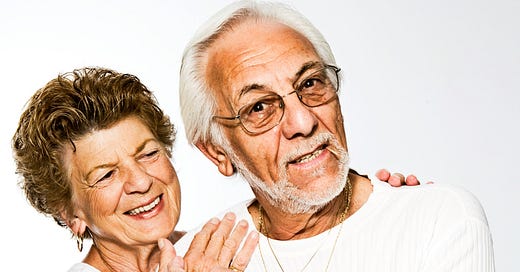"Grace of Years"-Allan N Schwartz "Wrinkles tell of laughter spent, Of tears, of love, of where we went. A map of life across the face, Each line a trace of earned grace." "The Whole of Me"-Allan N Schwartz "Do not divide me, part by part, This aged hand, this quiet heart. See instead a spirit whole, In elderhood, a well-worn soul."
I am 82 years old, and it is startling that I am that age. People have told me it's just a number, and I have responded in the past, but it's a very large number, and I say that jokingly. I've noticed that there are people I've never met before, beginning in my 70s and continuing to my 80s. Neighbors, for example, will call me sir. I have never been called “sir.” in actuality. This is pointed out in Louise Aranson's book "Elderhood: Redefining Age, Transforming Medicine, Reimagining Life." People will call women my age, and they will call men my age, sir.
In her book, Aronson discusses the issue of aging in society. Society often has a negative view of aging. Aronson highlights that we should not see old age as just a time of decline but as one of the important life stages, each with its own value. Society often pushes a narrow definition of aging, disregarding the diverse experiences of older adults.
Aronson points out the problem of viewing older individuals as just parts rather than whole people. Instead of recognizing their unique experiences and contributions, we often focus on what might not work as well anymore. This limited view reduces them to a list of health problems, overshadowing their wisdom and personality. Consequently, society misses out on the valuable insights and experiences they provide.
The discussion around aging also needs to change. By altering the language we use about old age, we can start seeing it as a valuable phase rather than an unpleasant one. Aronson argues that if we only focus on limitations, we overlook the positives, pleasures, and sense of purpose of being older. Older adults have their own ways of living that can be as fulfilling as younger generations.
The key idea is that we are more than just our physical conditions. For older adults, we need to acknowledge their full identity rather than just their challenges.
Every life stage has importance. Aronson's work urges us to honor elderhood's complete and rich nature. It encourages us to look at aging in a wider context and recognize older adults for who they truly are. They are full individuals with much to contribute and experiences to enjoy.







This is great, thank you. I'm 73 and am seeing the subtleties of ageism. I am healthy and vigorous in life, still working - coaching, consulting, mentoring, and teaching. My life is as rich as it's ever been, and I'm in the question of the best use of me at this point in my life. Approaching 60, I declared myself "elder" and assumed that responsibility. On my 70th birthday someone asked, "Any words of wisdom?" My response was that I refuse to be irrelevant.
Taking a stand (soft stand) for our value and wisdom is one way we can support our fractured world. Refuse to be irrelevant!!
“When an elder dies, a library burns” is a quote attributed to Amadou Hampâté Bâ, a Malian intellectual who lived from 1901 to 1991.